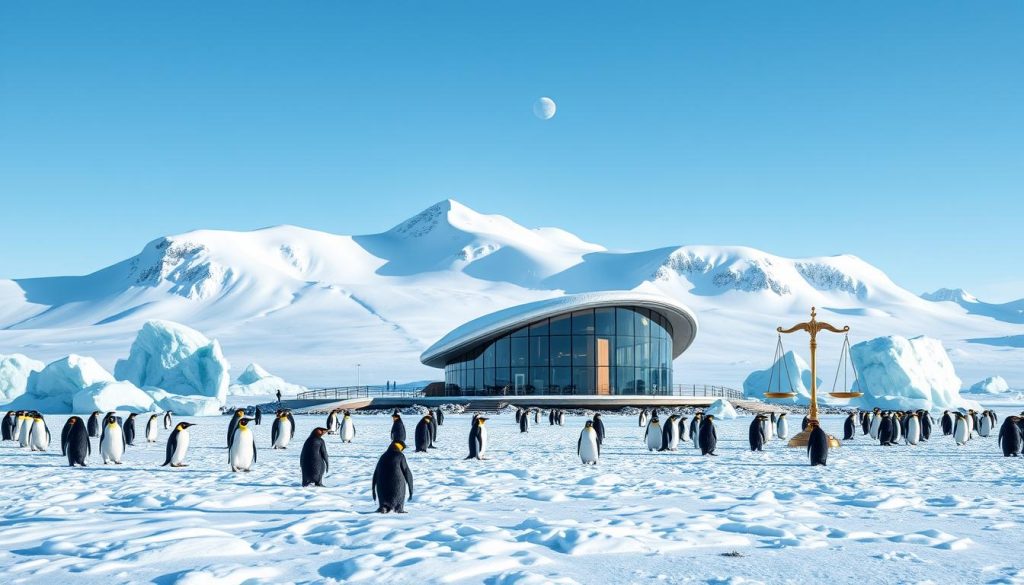Starting a business in Antarctica is a unique adventure, full of challenges and opportunities. Its special geography and politics shape these. Entrepreneurs must learn the legal rules for doing business there. This means knowing about international treaties and rules that apply to the continent.
As someone eager to start a business, understanding these legal aspects is key. You need this knowledge before you set off on your Antarctic business journey.
Understanding Antarctica’s Unique Business Landscape
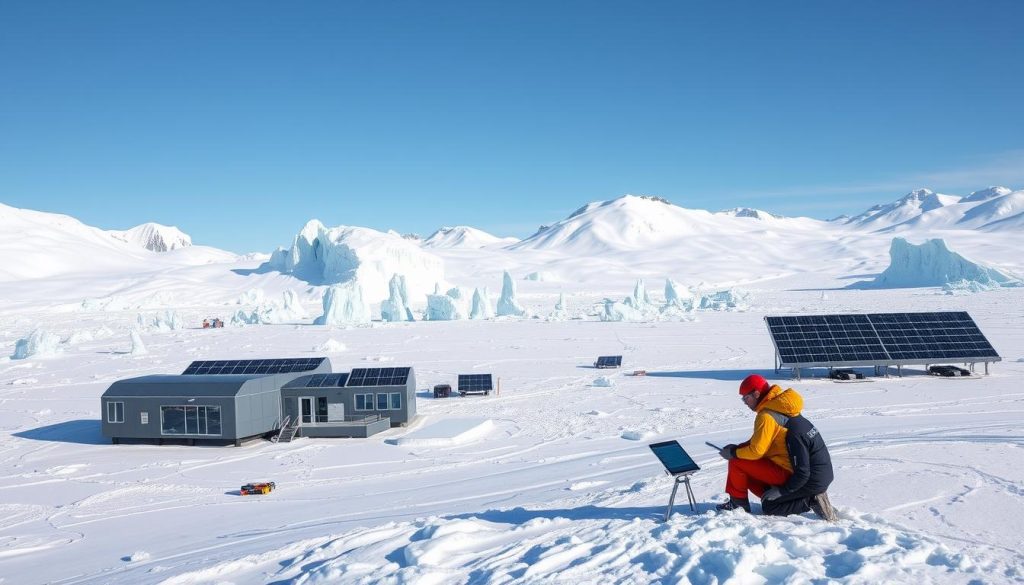
Antarctica’s business world is unlike any other due to its distinct challenges. Entrepreneurs navigate through extreme weather and isolation. Grasping these elements is crucial for those aiming to start ventures in this secluded area.
The region poses tough hurdles, such as unpredictable weather impacting supplies and work. The limited infrastructure further complicates matters, making logistical support sparse. Firms must also follow strict rules set by the Antarctic Treaty System. This system governs business while supporting science and safeguarding the environment.
Yet, within these hardships, there are chances for creative business people. The push for environmental care offers openings for eco-focused companies. By joining hands with worldwide bodies, businesses can gain trust and function better. Knowing Antarctica’s business landscape helps entrepreneurs succeed, even with obstacles.
The Importance of Complying with Legal Requirements
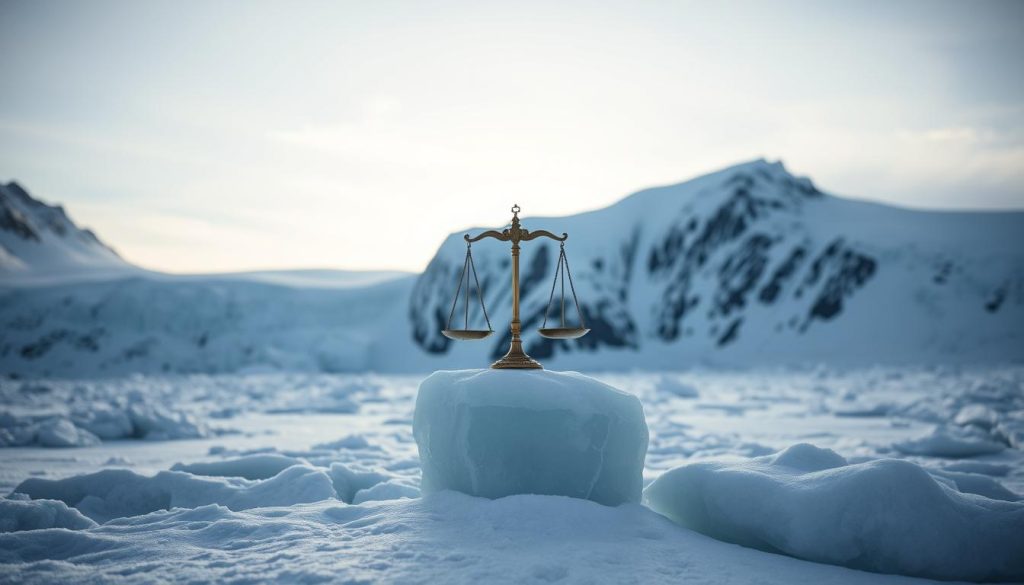
Running a business in Antarctica requires knowing its business laws well. It’s vital to comply with these laws. This affects the business’s lasting success and worldwide image. Every business must carefully follow legal rules.
If companies ignore these laws, the outcomes are serious. They might get big fines, have to stop operating, or face legal challenges. This could ruin their good name. It affects vital partnerships and global connections, especially in a place as special as Antarctica.
- Demonstrates commitment to ethical business practices
- Protects against legal risks
- Enhances trust with stakeholders and partners
By valuing legal compliance, businesses in Antarctica create a safe, successful environment. This sets the stage for future projects. It shows a real dedication to ethical business.
Legal Requirements for Starting a Business in Antarctica

Starting a business in Antarctica means deeply understanding its laws. It’s vital for entrepreneurs to know Antarctic business rules. They must learn about licences and permits needed. Sticking to these rules makes sure businesses work right and care for the environment.
Overview of Key Regulations
Business rules in Antarctica come from big international agreements, mainly the Antarctic Treaty System. This covers protecting the environment and working together in science. Business owners need to know:
- The Antarctic Treaty, which sets the rules for all activities.
- Environmental rules to protect the unique ecosystem.
- International standards for safety and how to operate.
Necessary Permits and Licences
Getting the right papers is crucial. You apply through national bodies that manage Antarctic activities. Different activities need different documents. Important ones include:
- Permits for research and finding out new things.
- Licences for taking tourists there, when needed.
- Approval for the impact on the environment.
Understanding Antarctic business rules and getting needed permits makes starting a business there clearer.
Organising Your Business Structure

Starting a business in Antarctica needs thoughtful planning about the types of entities available. Each choice has its pros and cons that impact how your business runs. It’s crucial for business owners to get these differences, especially in such a unique place.
Choosing the Right Business Entity
Entrepreneurs have several options for their business structure, including:
- Partnerships: This lets people work together, sharing both profits and duties. It’s easy to start but might risk personal assets for business debts.
- Limited Companies: This option creates a separate legal being, protecting owners’ assets. It’s a bit harder to set up but helps greatly with managing risks.
- Sole Traders: The easiest form, with one person in charge. It offers total control but means taking on all risks alone.
Picking the right structure is key for following local laws and meeting your own goals.
Implications of International Treaties
International treaties affect business in Antarctica. They cover environmental care, using resources wisely, and working together on science. Business owners must know these rules because they shape the legal side of running a business there. Making sure your business fits with these global rules is vital for staying lawful and sustainable.
Navigating Environmental Regulations
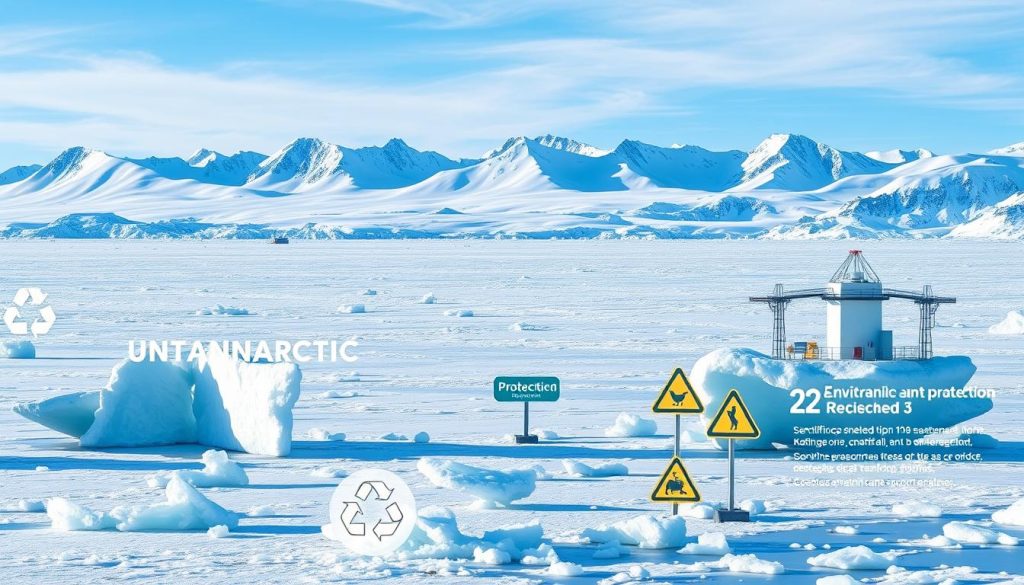
Doing business in Antarctica requires a good grasp of its strict environmental rules. These aim to shield the continent’s delicate ecosystem and encourage firms to operate responsibly. At the heart of these measures is the Protocol on Environmental Protection. It sets the standards for reducing harm to the environment.
Understanding the Protocol on Environmental Protection
The Protocol on Environmental Protection is crucial for the continent’s environmental policy. Since its introduction in 1991, it has provided a detailed blueprint for conserving Antarctica’s untouched nature. It bans practices harmful to the ecological balance and demands nation signatories to enforce these rules. Every business must follow these guidelines to protect local species and Antarctica’s overall environment.
Environmental Impact Assessments
Prior to starting projects in the region, it’s key to carry out environmental assessments. These assess the possible environmental dangers of operations, making sure they meet Antarctica’s strict regulations. Confidence in thorough Environmental Impact Assessments (EIAs) is vital. They help spot and lessen damaging impacts. Through these assessments, businesses not only follow the Protocol on Environmental Protection but also boost their operations’ sustainability in Antarctica.
Visa and Residency Requirements for Business Owners
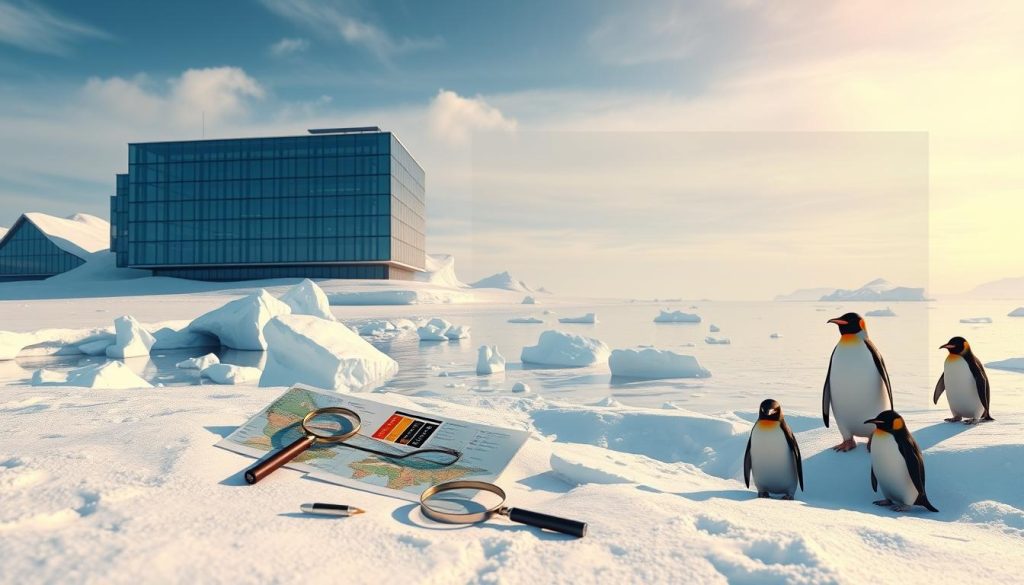
Starting a business in Antarctica means learning about visas and residency rules. These are key for running your business well. It helps to know these rules inside out.
There are different visa types for businesspeople from abroad. The main visa lets you do business while you’re there. You’ll need to show a detailed business plan and proof you have enough money. You also have to follow the local environmental rules.
Having the right to live there can make business easier. If you’re a resident, you might find business goes more smoothly. It’s important to understand what residency means for your business in the long run.
But there’s more than paperwork. Living and working in Antarctica comes with unique challenges. The harsh conditions affect everything from getting supplies to where you live. Business owners must be ready to tackle these issues creatively.
Insurance and Liability Considerations
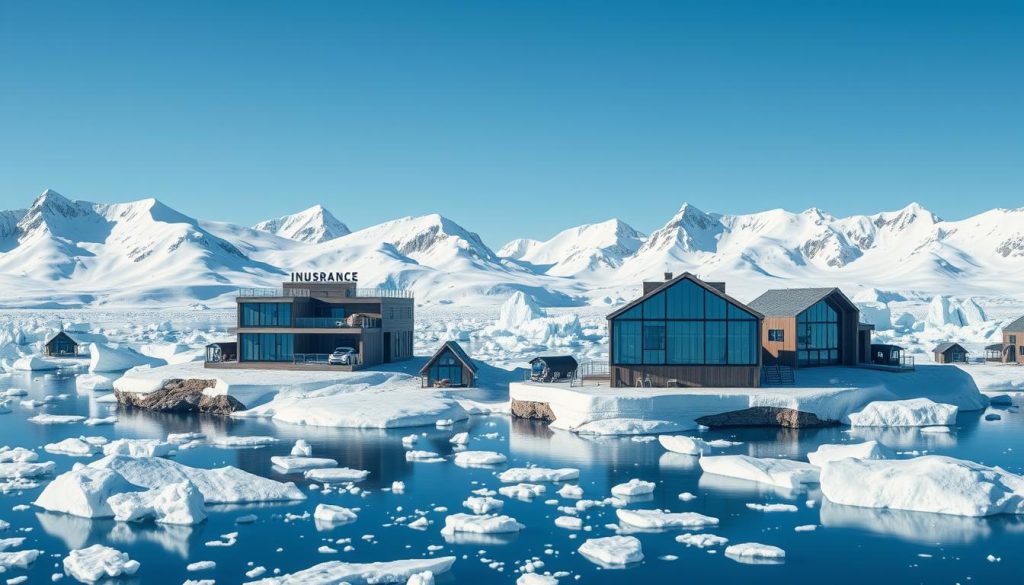
Running a business in Antarctica comes with challenges that require thorough insurance. Extreme weather, isolation, and complex international laws add to the risks. The right insurance will protect your finances, your workers, and your assets.
Consider these key insurance types for your Antarctic business:
- General Liability Insurance: Protects against accidents or damages on-site.
- Property Insurance: Covers equipment and facilities against environmental damage.
- Workers’ Compensation: Crucial for employee safety if injuries occur at work.
- Environmental Liability Insurance: For claims related to environmental harm and spills.
- Business Interruption Insurance: Offers compensation if unexpected events stop your business.
Knowing about these insurance options helps businesses feel secure in Antarctica. With the right insurance, companies can focus on their goals while reducing risks.
Establishing a Presence: Office Setup in Antarctica

Setting up an office in Antarctica means facing unique challenges. First, you must find the right place. It should be easy to get to and follow local laws. The extreme cold and weather also require strong buildings.
- Accommodation for necessary equipment that remains operational in harsh climates.
- Access to reliable communication channels, which may include satellite internet services.
- Proper storage for supplies, keeping in mind the limited availability and high costs of transport.
Success hinges on following the local rules, focused on safety and protecting nature. Working with local experts familiar with Antarctica’s terrain helps ensure a smoother setup.
In short, getting the logistics right and adhering to guidelines is key for an effective Antarctic office.
Maintaining Compliance with International Laws
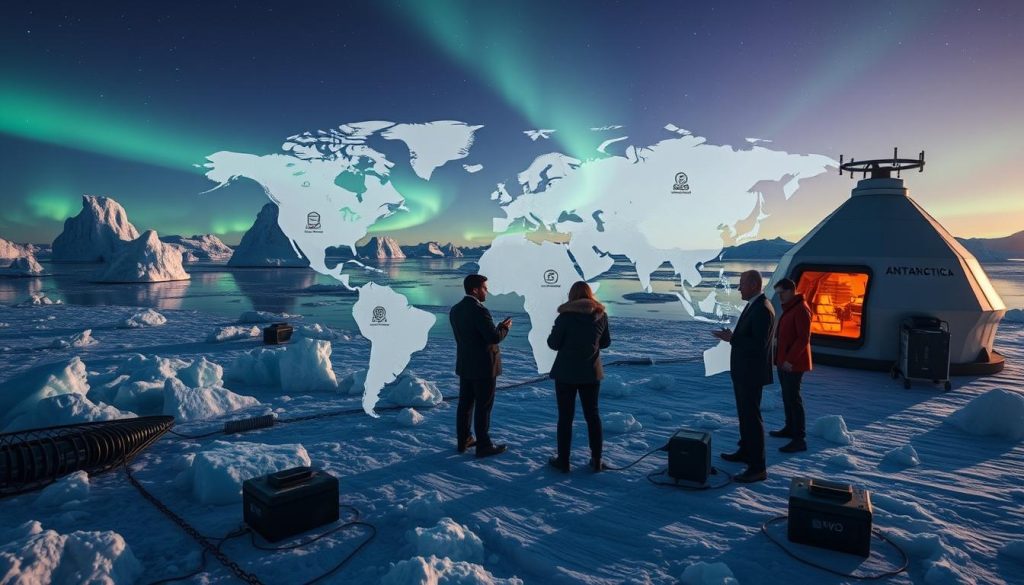
Running a business in Antarctica demands following international laws closely. These laws create a legal framework for the area. They make sure businesses follow both national and international rules, including treaties about Antarctica.
To keep in line with international standards, Antarctic businesses need to know and follow different treaties, like the Antarctic Treaty System. This system promotes peaceful cooperation and taking care of the environment in the region.
- Environmental Protection: Companies must check the environmental impact of what they do. The Protocol on Environmental Protection sets rules to reduce harm to nature.
- Trade Regulations: Firms have to deal with trade limits that protect Antarctica’s unique ecosystem, following international rules.
- Research Considerations: Businesses doing scientific research must stick to international guidelines. Their work should fit within the legal framework for Antarctica.
It’s critical for businesses to understand their legal duties. Keeping up with new regulations through ongoing training helps companies. This way, they act lawfully and care for one of the Earth’s precious areas.
Financial Regulations and Tax Obligations
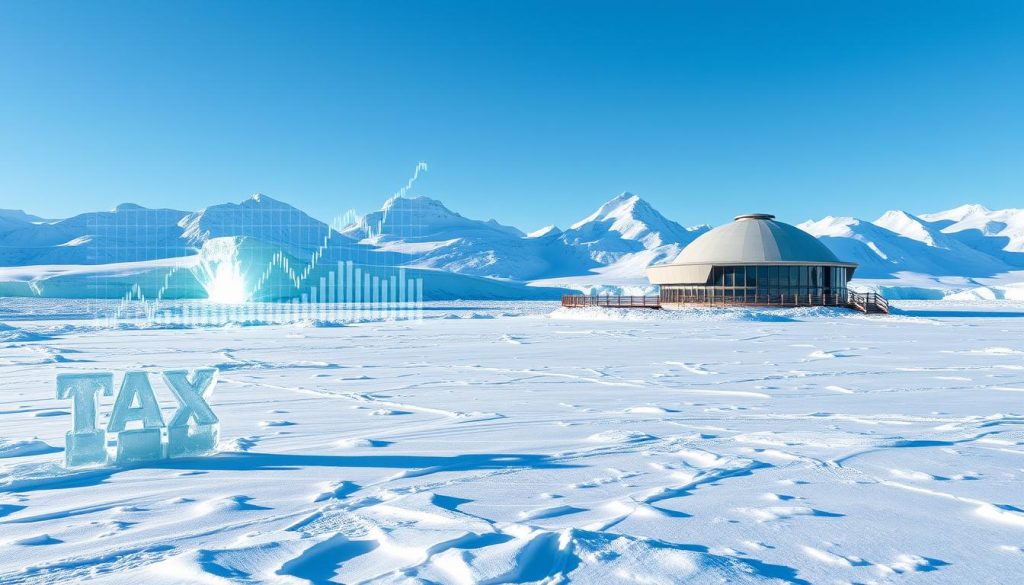
Starting a business in Antarctica means you need to understand its complex financial rules. These rules are essential to follow for your business to survive and thrive. You’ll also need to know about Antarctic taxes, as they affect how much your business spends.
Understanding Tax Treaties and Agreements
Tax treaties are important because they stop businesses from being taxed twice on the same income. It’s beneficial to talk with tax experts who know about Antarctic laws. They can tell you which tax treaties apply to your business.
Key considerations include:
- Figuring out which treaties apply based on where your main company is.
- Knowing how these agreements impact the money you send back home.
- Learning about any special tax breaks or lower rates you can get.
Accounting Standards in Antarctica
Keeping up with accounting rules in Antarctica presents its own set of challenges. You must keep detailed records and report finances accurately to meet both local and global rules. Key things to remember are:
- Using International Financial Reporting Standards (IFRS) for worldwide consistency.
- Keeping precise records of all money matters.
- Getting regular audits to stay in line with the rules.
Choosing the Right Location for Your Business
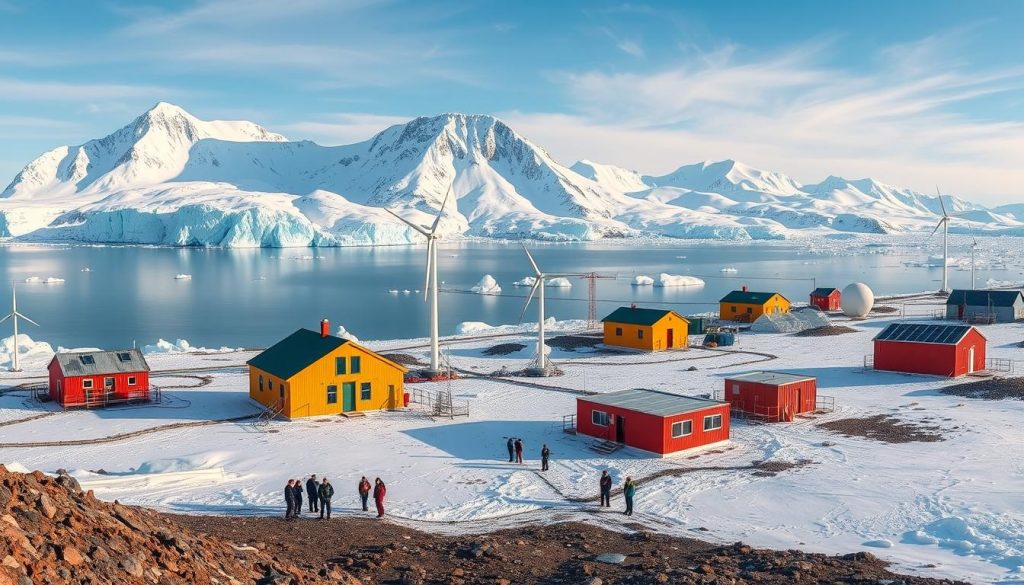
Finding the perfect spot for your business in Antarctica is about more than just the place. There are many important things to think about. Things like how the area affects how well you can work and how easy it is to get around. The cold and far-off land of Antarctica brings its own set of challenges. So, picking where to set up is key.
- Accessibility: Being close to airstrips and the sea is crucial for getting supplies and people where they need to go.
- Research Stations: Being near research stations means help and the chance to work with scientists might be nearby.
- Environmental Considerations: You must pick a place carefully to protect nature and follow the rules for keeping Antarctica clean.
- Climate Factors: Some places have more stable weather, which can make running your business easier all year round.
If you’re thinking of starting a business in Antarctica, you need to look closely at these things. Taking the time to choose wisely means less hassle later. It helps your business last in one of the toughest places on Earth.
Engaging with Local Communities
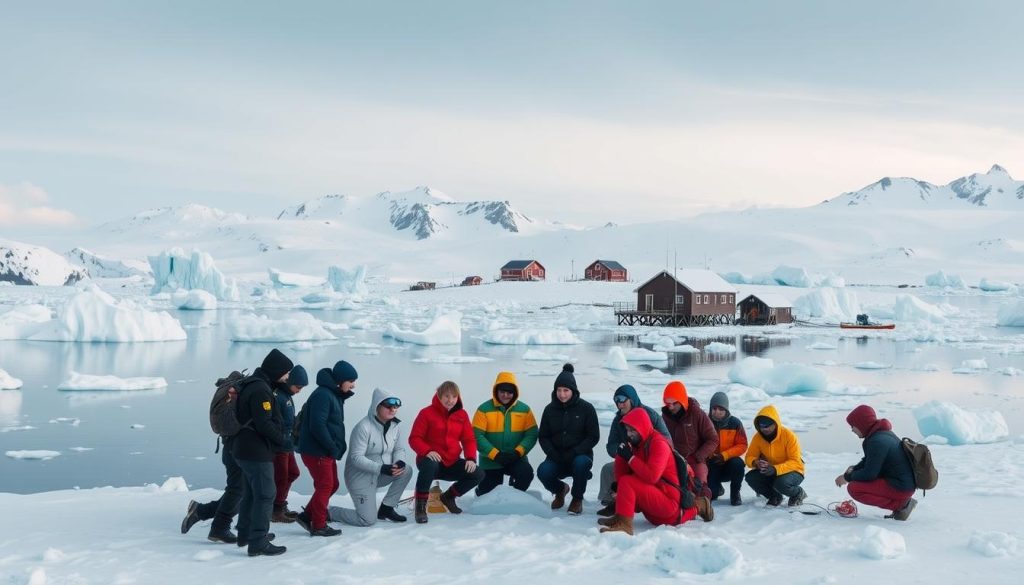
Working well with local communities in Antarctica is key for any business’s success there. It is essential to form strong bonds with local groups. This helps tackle the distinct challenges of the Antarctic.
When businesses team up with others, like researchers and suppliers, they do better. These alliances boost how well operations run and help the business care more for the environment. Important focuses include:
- Getting help with logistics from local businesses
- Working with scientists to meet environmental guidelines
- Joining forces with conservation groups to protect nature
Connecting with local communities improves how we share knowledge and handle resources. By putting community engagement first in Antarctica, companies can improve their work and help preserve the local environment.
Challenges of Running a Business in Extreme Conditions
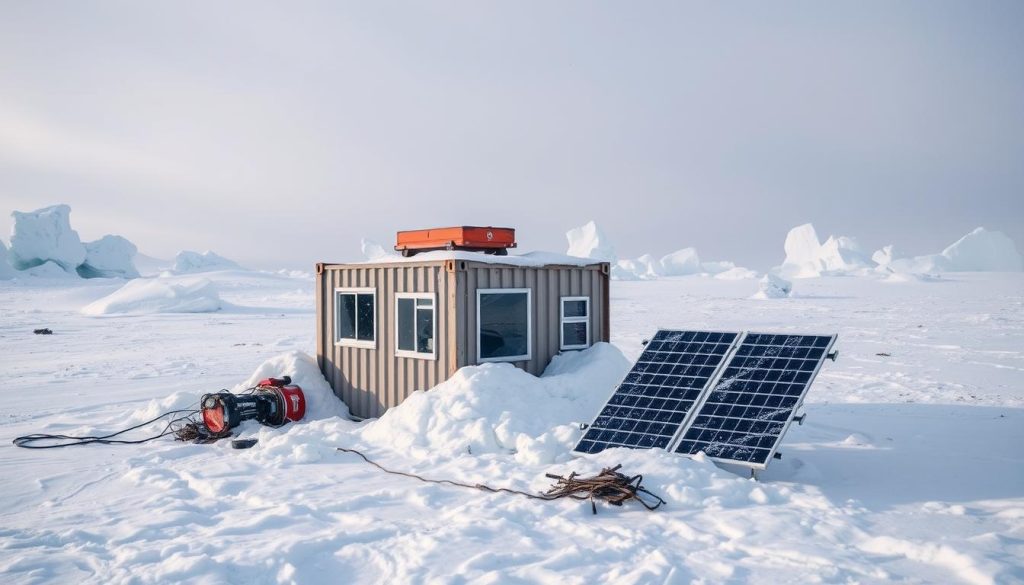
Starting a business in the Antarctic is full of unique challenges. The harsh and unpredictable weather makes it tough. Entrepreneurs must think of new ways to overcome these obstacles and plan carefully.
The weather is a big challenge. Extreme cold, blizzards, and ice can stop work and are dangerous. To stay safe, businesses need emergency plans, trained staff, and equipment that can handle the cold.
Moving goods in and out of the continent is also hard, causing delays. Having a strong supply chain is vital because resources are scarce. To deal with this, some businesses work with logistics firms that know about Antarctic conditions.
Finding skilled workers is another issue. The remote location makes it hard to attract the right people. Businesses need to offer good pay and a great workplace culture to keep their staff happy.
There are also financial risks to think about. Starting a business here means risking a lot of money with unsure returns. Good financial planning and insurance can reduce these risks.
To succeed, business owners need to be creative and tough. Understanding the challenges of Antarctic business is key. With the right approach, they can make their business work even in such an extreme place.
Resources for New Entrepreneurs in Antarctica
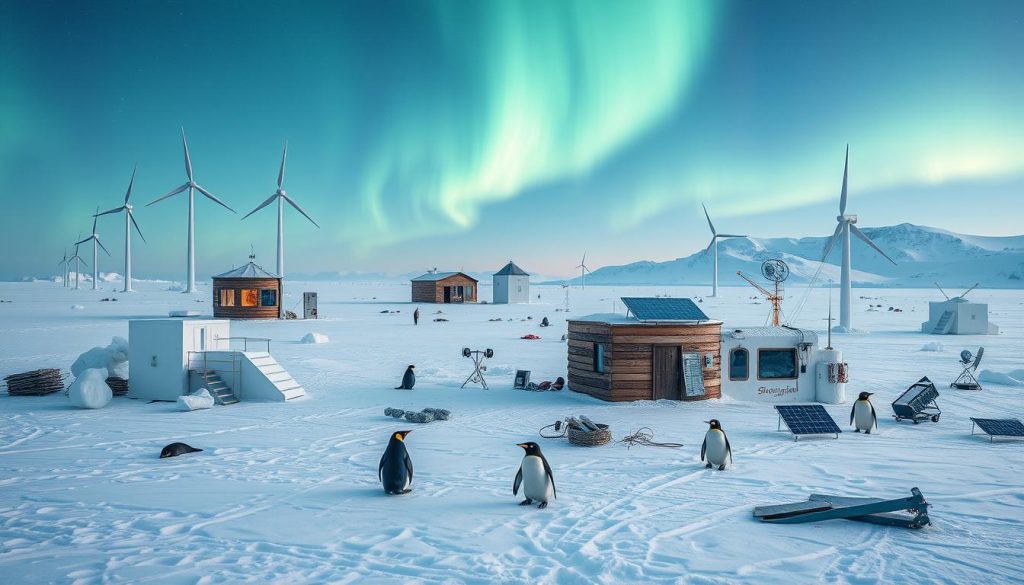
Starting a business in Antarctica is tough, but many resources for Antarctic business owners help make it easier. Entrepreneurs should look into government agencies, non-profit organisations, and online platforms for important advice.
- Government bodies offer much-needed information on following the law and getting the correct permits.
- Non-profit organisations focus on sustainable growth and have money-helping schemes.
- Online forums are great for meeting others, sharing stories, and getting tips from experts.
Using these platforms greatly supports entrepreneurs who want to do well in Antarctica’s challenging business world. Getting involved with these resources builds your knowledge and encourages working together. Both are key for achieving success in this special place.
Networking and Building Partnerships
Networking in Antarctica is vital for success. By meeting other business owners and experts, you get seen more. This can lead to working together. Sharing what you have, learning local ways, and overcoming tough challenges become easier.
To build strong ties, you must be clever in your approach. Joining events and projects in your field helps a lot. It’s also smart to connect with research groups. Their knowledge can make your business better and help it last longer in such tough conditions.
Lastly, good networking in Antarctica can really lift your business up. It’s important to find and create partnerships that use everyone’s best skills. These strong connections make your business tougher. They help you stand out and do well over time.

